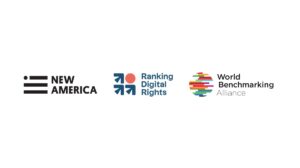
Photo by ev on Unsplash.
In 2022, as part of our effort to expand corporate accountability in the Majority World under the auspices of the Greater Internet Freedom Consortium, we partnered with the Balkan Investigative Reporting Network (BIRN) to collaborate on a research project using the RDR Index methodology. BIRN studied the freedom of expression and privacy policies of 13 telecom operators in Albania, Bosnia and Herzegovina, Kosovo, North Macedonia, Moldova, and Serbia. The report, titled Hidden in Plain Sight, which includes the findings from all the countries, was published in June 2023.
BIRN’s research in Albania was carried out during a moment of tectonic shifts in the national telecommunications landscape. In 2022, two of the three major players were being acquired by one foreign company, with a plan to merge them into a single operator at the beginning of 2023.
The companies in question were ALBtelecom and ONE Telecommunications; both were bought by the Hungarian telecom and ICT juggernaut 4iG. BIRN evaluated these companies separately, as well as evaluating the third company, Vodafone Albania. This research set a baseline for understanding changes in policies and practices that may occur after the merger.
4iG has a special place in Hungary’s current political landscape. The company enjoys close ties with Prime Minister Orbán, who has been vying to exert even greater influence on the Balkans region. Orbán and his inner circle believe that expanding their control over the telecommunications sector allows them to collect information on a massive scale and stop their opponents from using the information networks against them. In fact, 4iG’s CEO has stated that his company sees significant growth potential in the Western Balkans and intends to increase their presence in the region. To that effect, over the past three years, 4iG has gone on a shopping spree of sorts. The company acquired Vodafone’s business unit in Hungary, as well as Telenor’s operations in Montenegro, later rebranding the subsidiary to ONE. 4iG just recently signed a memorandum with the government of North Macedonia confirming their intention to enter that market as well.
Early in 2024, BIRN conducted a followup assessment in Albania, to learn more about what took place after 4iG merged ALBtelecom and ONE Telecommunications under the new brand ONE Albania.
According to these most recent findings, the worrisome transparency gaps first uncovered in Hidden in Plain Sight remained. Neither Vodafone Albania nor ONE Albania disclosed any information about the process used to respond to government demands to restrict content or accounts and whether users are notified of restrictions to their accounts or content. The companies also lack the crucial transparency reporting needed to inform their users and the public about the volume and nature of the actions taken to restrict content that violates the companies’ rules, the number of demands received from government bodies (including judicial orders) to remove, filter, or restrict content and accounts, and government demands to share personal data from their users. Relatedly, neither company publicly commits to pushing back against potentially overreaching government demands.
ONE Albania made slight progress compared to its predecessors–ALBtelecom and One Telecom–on two privacy indicators assessing whether the company discloses what user information it shares and with whom, as well as why it collects, infers, and shares user information. On these indicators, ONE Albania disclosed some details about its data-sharing practices on the company’s Privacy Code. However, they remain superficial, using broad terminology, and leaving out details about the types of data that is shared. Neither Vodafone Albania nor ONE Albania provide any information about how they collect and share user information from third parties.
This research confirms what we at Ranking Digital Rights already know: Given their powerful position to both enable and undermine the enjoyment of human rights, telecommunication companies need to do better. And to ensure they do, we need greater accountability. In 2022, the same year this research was first conducted, my former colleague at RDR, Hungarian researcher Veszna Wessenauer, wrote about the Orbán government’s pursuit of ‘national ownership’, including of the telecom sector. In particular, she noted the risks inherent in the Hungarian state’s purchase, alongside government-aligned 4iG, of Vodafone Hungary. With the Hungarian government now bringing similar tactics into the Balkans, her call for a renewed focus on telcos and for the need for greater transparency, including on demands for shutdowns and the censoring of user content, continues to ring true, especially for companies operating under the reach of authoritarianism, whether from at home or abroad.




